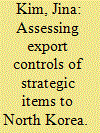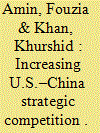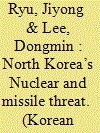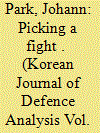|
|
|
Sort Order |
|
|
|
Items / Page
|
|
|
|
|
|
|
| Srl | Item |
| 1 |
ID:
154928


|
|
|
|
|
| Summary/Abstract |
This paper aims to show trading patterns of certain items highly likely to be used
to develop nuclear and missile programs in North Korea. It analyzed North Korea’s
trade of nuclear―and missile―related items for ten years from 2006 to 2015 to
identify items in large volume as well as in increased demand and key suppliers
that contribute to sanctions―busting. This paper found that UN sanctions against
North Korea were not effective in controlling the flow of strategic items to North
Korea. Rather, a small number of states are responsible for a large share of trade
with North Korea that has continued to seek alternative suppliers. It also found
that China is a single supplier for multiple items and plays a major role along with
several others that either specialize in exports of specific items or gradually expand
the scope of supplies. Because the presence of a third country that provides North
Korea’s resilience and diversion of sanctions is crucial, this paper recommends
policy suggestions to enhance effectiveness of the existing sanctions regime.
|
|
|
|
|
|
|
|
|
|
|
|
|
|
|
|
| 2 |
ID:
154931


|
|
|
|
|
| Summary/Abstract |
Whatever motivations lie behind North Korea’s nuclear and missile programs, North
Korea has been aware that further nuclear and missile tests would incur increasingly
harsh international sanctions. In order to survive the sanctions, North Korea needs
to entrap China to its side, for the North Korean economy is highly dependent upon
China. In this context, this article argues that North Korea intentionally increases
the level of its nuclear and missile threat in order to entrap China (thus, reducing its
fear of being abandoned by China). That is, North Korea has elaborated its coercive
diplomacy in order to press China to show a strong commitment to their mutual
alliance. In order to develop the above argument, this article proceeds as follows.
First, as an analytical framework, it applies Glenn Snyder’s concept of the linkage
between the alliance game and adversary game to the trilateral relationship among
the United States (along with South Korea), China and North Korea. Second, it
provides an overview of Sino–North Korean relations from 2006 up to the present,
attempting to analyze North Korea’s brinkmanship. Thirdly, it concludes with some
policy implications for future trilateral relations, one of which is that China should
seriously discuss North Korea contingency plans with the United States and South
Korea in order to develop an effective strategy to curb North Korea’s military
adventurism. Paradoxically, this would lead to North Korea’s fully considering
China’s position.
|
|
|
|
|
|
|
|
|
|
|
|
|
|
|
|
| 3 |
ID:
154939


|
|
|
|
|
| Summary/Abstract |
Historically, China had been a great power and had maintained the largest economy
in the world for quite a long time. It would, therefore, like to regain its lost status.
There is consensus among many scholars that China would rise peacefully by
adopting the five “principles of peaceful co-existence”, thus, it would take a leading
role in the 21st century. It is viewed that the United States is already convinced to a
great extent that it might not be able to maintain sole dominance for too long in the
backdrop of the rising Chinese economic and military power. Based on an in-depth
analysis of the issue, the study concludes that China would avoid clashing with
Washington and its allies while protecting its economic interests across the globe.
Nevertheless, the Chinese would react if their core interests are threatened by the
United States and its allies including India. In order to protect its long-term interest
in the region and beyond, China would gradually develop its military including its
maritime capabilities to increase its influence beyond China’s periphery. However;
it is highly unlikely that in the near future, China would contest the United States
and its allies beyond the South China Sea. The study also concludes that in this
great ongoing game between the quadrangles of the countries, if India makes a
principle decision to stand by the United States in the case of a conflict with China
over the Indian Ocean, such a scenario would limit Pakistan’s options to either join
China or stay neutral. Either of the two options would pose a serious challenge for
Pakistan. A decision to stay outside the Great Powers’ power politics would be even
more difficult.
|
|
|
|
|
|
|
|
|
|
|
|
|
|
|
|
| 4 |
ID:
154933


|
|
|
|
|
| Summary/Abstract |
The rise of China triggers a hot debate in the United States as well as in China
concerning whether a rising power can coordinate with the existing power or
inevitably confront each other. On this issue, some foresee a possibility of the
next great war between the two countries whereas others view the prospect of coevolution
in which Beijing and Washington can shrewdly evade armed conflicts.
This paper tries to illustrate how the United States and China are expanding their
naval capabilities in parallel with the ongoing strategic debate within China and
the United States. The rivalry between the two countries can have a lot of influence
on the foreign policies of neighboring countries like South Korea and Japan. This
paper also deals with how South Korea and Japan, comparatively small powers,
have responded to the super powers’ power game in the region. Finally, this paper
suggests some policy proposals for South Korea to play a role in stabilizing the
regional order.
|
|
|
|
|
|
|
|
|
|
|
|
|
|
|
|
| 5 |
ID:
154929


|
|
|
|
|
| Summary/Abstract |
Despite the unceasing efforts of the international community to halt North Korea’s
nuclear ambitions, North Korea’s nuclear development and missile technology
have aggressively progressed over time. Why did the efforts fail and what would
be the new direction to fix the problem, if necessary? To answer these central
questions, this paper attempts to analyze the problems of sanctions on North Korea
and assess North Korea’s nuclear development and capability. This paper suggests
that a recalibration of policy measures, including a dual–track strategy that, on the
one hand leads to internal change in the North, while on the other, results in strong
external pressure, continues to be significant for the ultimate resolution of North
Korea’s nuclear quandaries. If left alone, the nuclear situation in North Korea may
likely shift from the previously limited problem of denuclearization on the Korean
peninsula to the broader global concern of nonproliferation.
|
|
|
|
|
|
|
|
|
|
|
|
|
|
|
|
| 6 |
ID:
154936


|
|
|
|
|
| Summary/Abstract |
Research shows that autocracies as well as democracies have reasons to avoid
strong enemies. What, then, make democracies distinctive from autocracies
in conflict selection? A critical difference may lie in the normative constraints
democracies experience. Focusing on the roles of public sentiment and liberalism,
we argue that democrats bearing high levels of accountability are less likely to
choose armed conflict without justifiable causes. We assess the roles of three liberal
factors in regard to the characteristics of target countries: respect of human rights,
democratic representation, and economic interdependence. Material factors, such
as relative military capability and geographic constraints are also considered.
The results show that both autocracies and democracies tend to attack easier
foes, but democracies avoid attacking countries that respect human rights and are
economically interdependent. Additionally, unlike autocracies, democracies do not
view other democracies as attractive targets of military attacks.
|
|
|
|
|
|
|
|
|
|
|
|
|
|
|
|
| 7 |
ID:
154934


|
|
|
|
|
| Summary/Abstract |
If one understands North Korea’s provocations as terrorism rather than irregular
warfare, then terrorism is arguably a chronic national security threat to South Korea.
Similarly, the modernization of South Korea has put its citizens, corporations, and
soldiers out into the world and raised their exposure to traditional non-state (Islamic,
nationalist, and so on) terrorism. Yet South Korea’s two national security strategies
to date scarcely touch on the issue, while Korea’s foremost security journal, the
Korean Journal of Defense Analysis, has only published a handful of articles on
the topic. Hence, this article seeks to place terrorism more coherently within South
Korea’s growing grand strategy debate. It argues that Northern provocations fit
within post–9/11 thinking about terrorism, and that South Koreans are targets of
opportunity in the current salafist terror wave due to their alliance with America,
Protestant evangelization overseas, and status as Buddhists, Confucians, or
Christians in jihadists’ “clash of civilizations” mindset. Terrorism event counts
against South Koreans, including fatalities, are quantitatively presented. The totals
are low, so the threat, while new, is middling, not existential. South Korea need not
overreact as America arguably did to 9/11. Policies such as moderate homeland
security measures, distance from expansive U.S. goals in the war on terror, and a
wariness of Middle Eastern engagements are recommended.
|
|
|
|
|
|
|
|
|
|
|
|
|
|
|
|
| 8 |
ID:
154937


|
|
|
|
|
| Summary/Abstract |
The United States and China’s antithetical stances on freedom of navigation in the
South China Sea have consistently caused military tensions in East Asia. Based
on employing the crisis bargaining theory, this article postulates that the United
States and China are able to implement a hard-line strategy or an accommodative
strategy in dealing with the controversial freedom of navigation issue in the South
China Sea. This article categorizes each country’s strategies in a 2x2 model and
examines four different cases for exploring each country’s payoffs: Case (1) the
United States and China can both use force; Case (2) the United States can make
unilateral concessions and China can hold its original demands; Case (3) China can
make unilateral concessions and the United States can hold its original demands;
and Case (4) the United States and China can make strategic compromises to avoid
military clashes. This article maintains that the United States and China will choose
both accommodative strategies in order to avoid open military conflicts. This article
also contends that unilateral concessions either from the United States or China will
harshly damage one side’s interest, thereby both countries will not choose unilateral
concessions as a plausible option. In addition, both countries’ use of force is the
most unlikely option.
|
|
|
|
|
|
|
|
|
|
|
|
|
|
|
|
|
|
|
|
|